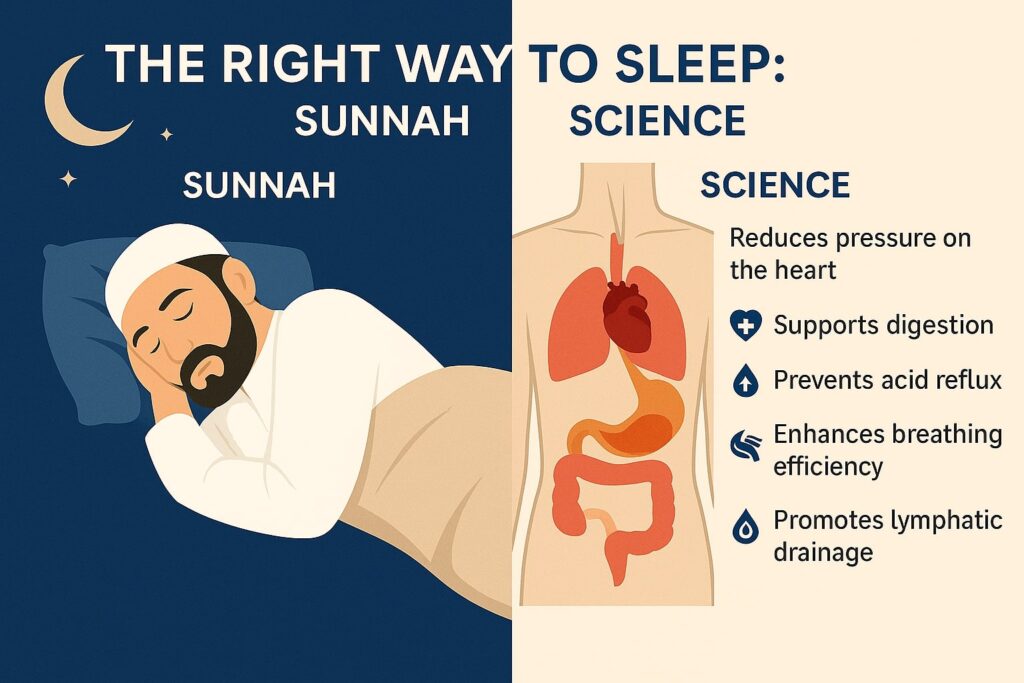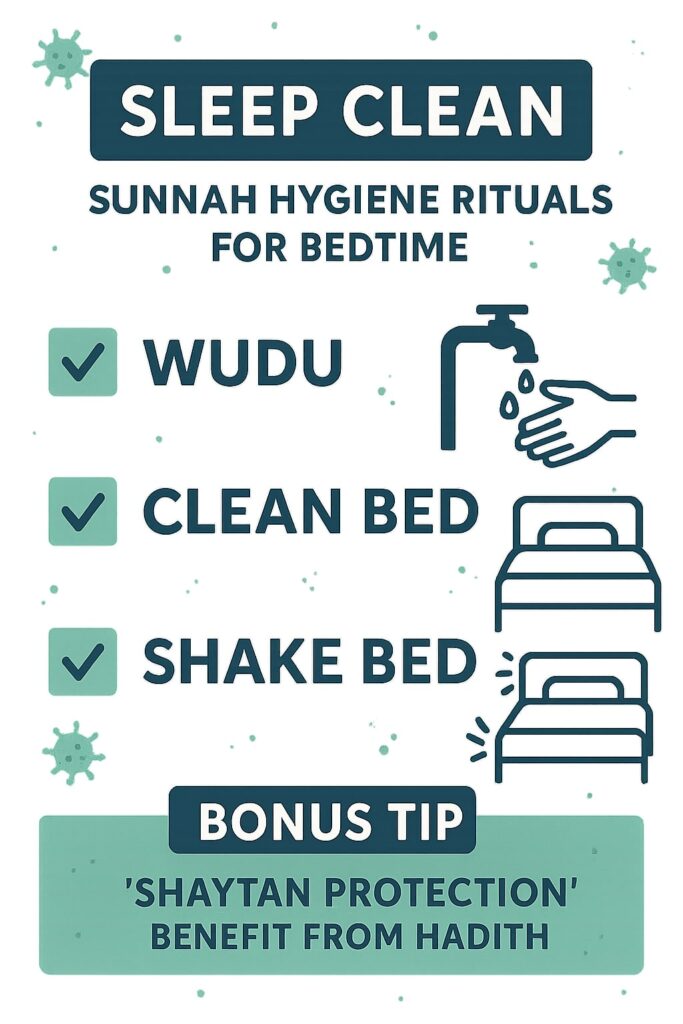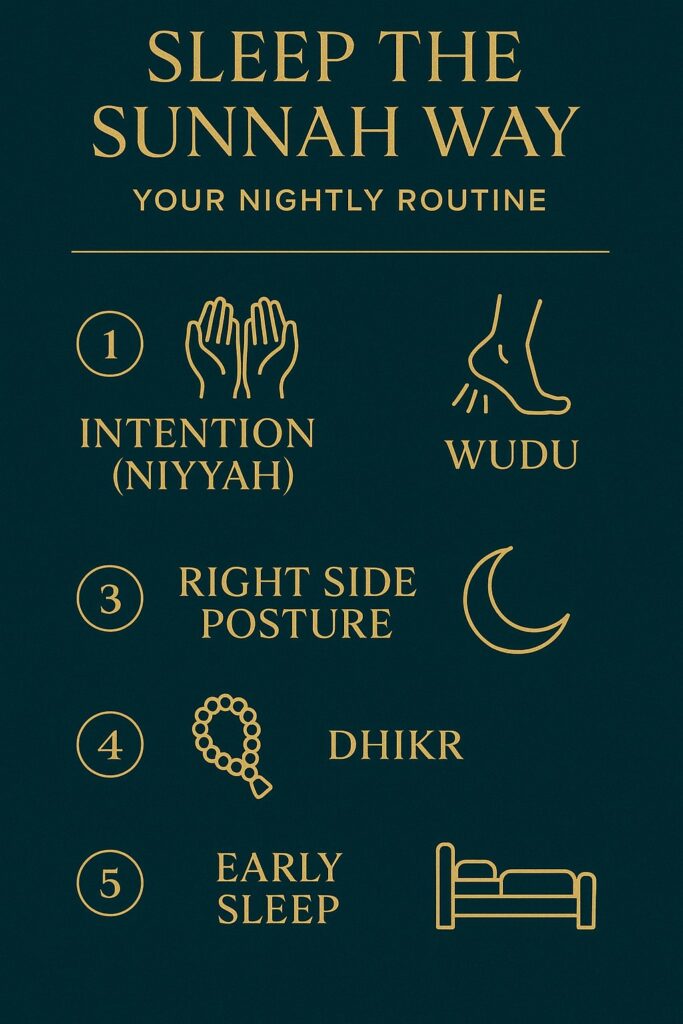🌙 Prophetic Sleep Teachings: Where Sunnah and Science converge
Sleep is not just a biological necessity—it’s a spiritual and holistic act in Islamic tradition. The Prophet Muhammad ﷺ exemplified the perfect balance between physical rest and spiritual mindfulness, even in the way he slept.
Modern science has only recently begun to uncover what the Prophet ﷺ taught over 1400 years ago. From sleep posture in islam and bedtime routine to mental health and hygiene, his practices offer a timeless roadmap to wellness.
This blog explores the prophetic sleep practices (Sunnah sleep) in light of modern scientific research—revealing how the Sunnah and science are beautifully aligned. Whether you’re seeking better rest, improved health, or deeper spirituality, the guidance of the Prophet ﷺ offers immense value.

“Indeed in the Messenger of Allah you have an excellent example…” (Qur’an 33:21)
Let’s dive into the night-time Sunnahs(Sunnah sleep) and discover how they enhance our lives both physically and spiritually. 🌌
🛏️ النوم على الجنب الأيمن – Prophetic Sleep Posture (Sunnah Sleep)
The Prophet Muhammad ﷺ taught us not only what to say before sleep but also the best physical position for sleeping. He consistently slept on his right side, a practice rooted in spiritual wisdom and confirmed today by medical science.
📜 Hadith 1 – Sleeping on the Right Side(Sunnah sleep)
Arabic:
كَانَ النَّبِيُّ ﷺ إِذَا أَخَذَ مَضْجَعَهُ مِنَ اللَّيْلِ، وَضَعَ يَدَهُ الْيُمْنَى تَحْتَ خَدِّهِ الْأَيْمَنِ، ثُمَّ يَقُولُ: اللَّهُمَّ قِنِي عَذَابَكَ يَوْمَ تَبْعَثُ عِبَادَكَTranslation:
“When the Prophet ﷺ lay down at night, he placed his right hand under his right cheek and said: ‘O Allah, protect me from Your punishment on the Day You resurrect Your servants.’”— [Sunan Abi Dawood 5045 | Sahih according to Al-Albani]
 ⚠️ Hadith 2 – Discouragement from Stomach Sleeping
⚠️ Hadith 2 – Discouragement from Stomach Sleeping
Arabic:
أَنَّ النَّبِيَّ ﷺ مَرَّ بِرَجُلٍ نَائِمٍ عَلَى بَطْنِهِ، فَرَفَسَهُ بِرِجْلِهِ وَقَالَ: إِنَّ هَذِهِ ضِجْعَةٌ يُبْغِضُهَا اللَّهُTranslation:
“The Prophet ﷺ passed by a man lying on his stomach. He nudged him with his foot and said: ‘Indeed, this is a posture that Allah dislikes.’”— [Sunan Abi Dawood 5040 | Hasan according to Al-Albani]
 🟦 Correction by the Prophet ﷺ: This Hadith clearly shows not only the Prophet’s guidance but also his active correction of harmful sleep practices. In this way, we can correlate sunnah and science.
🟦 Correction by the Prophet ﷺ: This Hadith clearly shows not only the Prophet’s guidance but also his active correction of harmful sleep practices. In this way, we can correlate sunnah and science.
✅ Scientific Evidence of Sleeping on the Right Side benefits (Sunnah sleep)
- 🫀 Reduces strain on the heart: The heart is slightly tilted toward the left, so lying on the right minimizes compression and promotes easier blood circulation — especially beneficial for people with heart conditions.
- 🧬 Improves lymphatic drainage: The lymph system, which removes waste from the body, drains more effectively when you lie on your right side, aiding in detoxification during deep sleep.
- 🌙 Relieves acid reflux and indigestion: Sleeping on the right side keeps the stomach lower than the esophagus, helping to prevent gastric acid from rising — especially after meals.
- 💨 Enhances breathing efficiency: Right-side sleeping improves lung expansion in most people, reducing the risk of sleep apnea and improving oxygen flow during sleep.
🚫 Scientific Disadvantages of Sleeping on the Stomach
- ❌ Neck and spine strain: Turning the head to one side while lying flat puts severe pressure on the neck and leads to spinal misalignment, causing stiffness or chronic pain.

- ❌ Restricted breathing: Sleeping on the stomach compresses the chest and diaphragm, reducing lung expansion and limiting oxygen intake — leading to shallow or disrupted sleep.

- ❌ Facial pressure and skin issues: Pressing the face into the pillow can lead to breakouts, wrinkles, and poor circulation in facial tissues.

- ❌ Risk of numbness or nerve damage: Extended pressure on the limbs or joints can lead to tingling, numbness, or even nerve compression (e.g., brachial plexus injury).
This wisdom from the Prophetic Sunnah is now echoed by global health experts — demonstrating how Islam provides guidance not just for the soul, but also for the body.In this way, we can correlate sunnah and science.
⏰ توقيت النوم في السنة النبوية – Prophetic Sleep Timing & Routine
The Prophet Muhammad ﷺ established a unique and balanced sleep schedule that supported both spiritual connection and physical restoration. This routine — sleep after ‘Isha, waking for Tahajjud, and midday napping — is now strongly supported by modern science.
🌙 1. Sleeping Early After Isha
Arabic:
كَانَ النَّبِيُّ ﷺ يَكْرَهُ النَّوْمَ قَبْلَ الْعِشَاءِ، وَالْحَدِيثَ بَعْدَهَاTranslation:
“The Prophet ﷺ disliked sleeping before the ‘Isha prayer and engaging in unnecessary talk after it.”— [Sahih al-Bukhari 568]
🧠 Scientific Insight: Sleeping shortly after Isha (ideally before 10 PM) supports the natural circadian rhythm regulated by melatonin, which peaks at nightfall. Disruption of this rhythm (by staying up late) is linked to increased risk of obesity, diabetes, depression, and cognitive decline.
🧪 Reference: Walker MP (2017). Why We Sleep. Scribner. Also supported by National Sleep Foundation guidelines on circadian sleep timing.
 🌌 2. Waking for Tahajjud (Last Third of Night)
🌌 2. Waking for Tahajjud (Last Third of Night)
Arabic:
كَانَ رَسُولُ اللَّهِ ﷺ يَنَامُ أَوَّلَ اللَّيْلِ، وَيُحْيِي آخِرَهُTranslation:
“The Messenger of Allah ﷺ would sleep in the early part of the night and worship during its last portion.”— [Sahih Muslim 736]
🧠 Scientific Insight: The last third of the night (approx. 3–5 AM) is associated with the natural rise in cortisol, body temperature, and alertness — making it the most effective time for reflection, creativity, and focused worship. This timing also matches the start of REM sleep cycles, critical for memory and emotional processing.
🧪 Reference: Czeisler et al. (1999), Harvard Medical School. Also see Frontiers in Endocrinology (2021) on cortisol awakening response and cognitive resilience.
🛌 3. Qailulah – Midday Nap
Arabic:
قِيلُوا فَإِنَّ الشَّيَاطِينَ لَا تَقِيلُTranslation:
“Take a nap (Qailulah), for the devils do not nap.”— [Reported by al-Tabarani | Hasan according to Al-Albani]
 🧠 Scientific Insight: Short daytime naps (10–30 minutes) improve alertness, mood, and performance. NASA research showed a 34% improvement in task performance and a 54% boost in alertness with brief naps. Qailulah aligns perfectly with modern neuroscience that shows midday rest helps reset brain fatigue and boosts learning.
🧠 Scientific Insight: Short daytime naps (10–30 minutes) improve alertness, mood, and performance. NASA research showed a 34% improvement in task performance and a 54% boost in alertness with brief naps. Qailulah aligns perfectly with modern neuroscience that shows midday rest helps reset brain fatigue and boosts learning.
🧪 Reference: NASA Ames Research Center Study (1995); MedlinePlus Sleep Health Reports; American Psychological Association – Sleep and Cognition (2019)
🕰️ Summary of the Prophet’s ﷺ Sleep Schedule
- 🌙 Sleep after ‘Isha – early night rest, avoiding distractions
- 🌌 Wake for Tahajjud – spiritual and neurological peak time
- 🌄 Begin day with Fajr – energized and mentally clear
- 🛌 Qailulah (nap) before Dhuhr – cognitive reset for the day
🌟 Conclusion: This natural prophetic sleep schedule balances the body’s sleep needs with spiritual development. What the Prophet ﷺ prescribed over 1400 years ago is now recommended by neuroscientists and sleep researchers worldwide as the model for circadian health and psychological well-being.In this way, we can correlate sunnah and science.
🧠 الفوائد الروحية والنفسية للنوم على السنة – Spiritual & Psychological Benefits of Sunnah Sleep
Sleep in Islam is not just physical rest — it’s an act of worship, reflection, and spiritual renewal. The Prophet Muhammad ﷺ taught not only when and how to sleep, but also what to say, feel, and focus on before sleeping. These practices have profound psychological and emotional benefits, now validated by science.
📿 1. Making Du‘a Before Sleep
Arabic:
بِاسْمِكَ اللَّهُمَّ أَمُوتُ وَأَحْيَاTranslation:
“In Your name, O Allah, I die and I live.”— [Sahih al-Bukhari 6324]
🧠 Psychological Benefit: Saying this du‘a helps the believer surrender their worries, fears, and control to Allah ﷻ before sleeping. It reduces nighttime anxiety and creates a sense of safety — psychologically known as “sleep security cues”, which help the mind disengage from stress.
🧪 Reference: AASM (2020). Sleep Anxiety and Bedtime Rituals: American Academy of Sleep Medicine.
🕋 2. Reciting Dhikr (Remembrance of Allah)
Arabic:
إِذَا أَخَذْتَ مَضْجَعَكَ فَاذْكُرِ اللَّهَTranslation:
“When you go to bed, remember Allah.”— [Sahih al-Bukhari 6320]
🧠 Psychological Benefit: Reciting dhikr before sleep lowers stress hormone levels (like cortisol), reduces heart rate, and calms the nervous system. Studies show that spiritual repetition (like SubhanAllah, Alhamdulillah, Allahu Akbar) can improve sleep onset and mental calmness.
🧪 Reference: Koenig HG, Religion and Mental Health Research (J Nerv Ment Dis. 2009); Sleep Medicine Reviews, 2021.
🛡️ 3. Protection from Nightmares & Evil
Arabic:
مَنْ قَرَأَ آيَةَ الْكُرْسِيِّ فِي لَيْلَةٍ لَمْ يَزَلْ عَلَيْهِ مِنَ اللَّهِ حَافِظٌ، وَلَا يَقْرَبُهُ شَيْطَانٌTranslation:
“Whoever recites Ayat al-Kursi before sleeping, Allah will protect him and no devil will come near him till morning.”— [Sahih al-Bukhari 2311]
🧠 Psychological Benefit: Nightmares are linked to subconscious stress and fear. Reciting Ayat al-Kursi builds a spiritual shield — and also mentally reinforces a feeling of protection, safety, and calm. This reduces nocturnal awakenings and improves sleep continuity.
🧪 Reference: Harvard Medical School (2020): Sleep & Trauma Recovery; Journal of Muslim Mental Health (2017)
❤️ Emotional & Mental Health Benefits of Sunnah Sleep
- 🧘♀️ Reduces bedtime anxiety through du‘a and spiritual surrender
- 🕯️ Improves emotional regulation by engaging calming thoughts (dhikr)
- 🛡️ Creates psychological safety through divine remembrance
- 😴 Improves sleep quality and reduces risk of insomnia and nightmares
The Prophet ﷺ beautifully integrated **faith and psychology** into bedtime — long before science discovered how thoughts and rituals affect sleep and emotional health. Following his example brings not only reward but also inner peace, balance, and healing.In this way, we can correlate sunnah and science.
🧼 نظافة الجسد والبيئة قبل النوم – Cleanliness & Sleep Environment in the Sunnah
The Prophet Muhammad ﷺ emphasized physical cleanliness and environmental purity as part of the bedtime routine. These actions are not only spiritually rewarding but also enhance the quality of sleep and hygiene — as modern sleep science confirms.
🚿 1. Performing Wudu (Ablution) Before Sleep
Arabic:
إِذَا أَتَيْتَ مَضْجَعَكَ فَتَوَضَّأْ وُضُوءَكَ لِلصَّلَاةِTranslation:
“When you go to bed, perform ablution as you would for prayer.”— [Sahih al-Bukhari 247]
🧠 Scientific Benefit: Washing before sleep lowers body temperature, promoting melatonin release and preparing the body for rest. It also removes dirt, allergens, and microbes, reducing risk of skin irritation, infections, and nighttime itch.
🧪 Reference: American Academy of Dermatology (2021); Sleep Foundation – Hygiene and Sleep Patterns (2020) and NIH
🛏️ 2. Shaking Out the Bedding Before Lying Down
Arabic:
إِذَا أَوَى أَحَدُكُمْ إِلَى فِرَاشِهِ فَلْيَنْفُضْ فِرَاشَهُ بِدَاخِلَةِ إِزَارِهِTranslation:
“When one of you goes to bed, let him shake his bed with the inside of his garment.”— [Sahih al-Bukhari 7393]
🧠 Scientific Benefit: Shaking the bedding helps remove insects, dust mites, and debris that may have settled during the day. It is a preventive hygiene habit that reduces allergic reactions, respiratory problems, and skin conditions.
🧪 Reference: American Lung Association – Bedroom Allergen Prevention Guide (2020)
 🧴 3. Sleeping on a Clean, Modest Bed
🧴 3. Sleeping on a Clean, Modest Bed
Though the Prophet ﷺ lived simply, he ensured cleanliness in all aspects of life. His bedding was modest — often made of leather stuffed with palm fibers — yet it was kept clean and uncluttered.
🧠 Scientific Benefit: Sleep environments free from clutter and strong artificial fabrics lead to better air quality, reduced stress, and deeper sleep. Clean sheets and natural bedding materials reduce microbial buildup and improve skin and respiratory health.
🧪 Reference: Environmental Health Perspectives (2016); National Institute of Environmental Health Sciences – Sleep Environment & Health
✨ Combined Impact on Sleep Quality
- 🧼 Wudu lowers body temperature, aiding faster sleep onset
- 🦠 Shaking bedding removes physical threats like insects or allergens
- 🌿 Clean sleep space promotes psychological comfort and mental calm
🌙 Sunnah sleep habits not only purify the soul but also create a safe, clean, and restful sleep environment — harmonizing Islam with proven principles of modern sleep hygiene.
📘 دروس وتطبيقات عملية من سنة النوم النبوي – Lessons & Practical Tips from Sunnah Sleep
The Sunnah sleep routine of the Prophet Muhammad ﷺ offers not just a set of rituals, but a timeless blueprint for achieving mental clarity, spiritual focus, and physical wellness. Here’s how you can integrate these teachings into your modern lifestyle with ease and intention.
💭 1. Sleep with Intention & Gratitude
Before sleeping, the Prophet ﷺ would recite du‘a, remember Allah, and reflect on the day. Begin your night with a grateful heart and a conscious niyyah (intention) to rest in a state pleasing to Allah ﷻ.
🧠 Benefit: Setting a mental intention helps reduce overthinking and anxiety at bedtime — a practice supported by cognitive behavioral therapy for insomnia (CBT-I).
⏳ 2. Maintain a Regular Sleep-Wake Routine
The Prophet ﷺ followed a predictable sleep schedule — sleeping soon after ‘Isha and waking during the last third of the night. Emulate this by going to bed and waking up at the same time daily, even on weekends.
🧠 Benefit: Consistent timing trains your body’s internal clock (circadian rhythm), improving hormonal balance, sleep quality, and energy levels.
📵 3. Avoid Screens & Distractions After Isha
The Prophet ﷺ disliked engaging in idle talk or activities after the night prayer. This can be adapted today as “digital discipline”: put away screens, dim lights, and create a calm, tech-free wind-down routine.
🧠 Scientific Note: Blue light from phones and screens suppresses melatonin, delaying sleep and increasing sleep fragmentation. Sleep scientists recommend zero screen exposure at least 30–60 minutes before bed.
🧪 Reference: Harvard Health Publishing (2019) – Blue Light and Sleep Disruption
♻️ 4. Use Sunnah Sleep to Reset Body & Mind
- 🌙 Sleep early to restore mental energy
- 🕋 Wake for Tahajjud to boost spiritual clarity and emotional resilience
- 😌 Practice gratitude and dhikr to calm your nervous system
- 🛏️ Sleep in a clean, calm space to promote relaxation
Whether you’re struggling with burnout, anxiety, poor sleep, or digital overload — the Sunnah offers a gentle reset button that reconnects body, mind, and soul to a healthy, sacred rhythm.In this way, we can correlate sunnah and science.
📊 “العلم يثبت صحة السنة” – Science Confirms the Sunnah Sleep
This infographic summarizes how specific Prophetic ﷺ sleep practices are now confirmed by modern scientific studies. It proves that what the Sunnah prescribed centuries ago is in perfect harmony with the findings of modern health science.
| 🛏️ Practice | 📜 Hadith Reference | 🔬 Scientific Backing |
|---|---|---|
| Sleep on Right Side | Sahih Bukhari 247, Muslim 2710 | Supports heart health & reduces acid reflux |
| Early Sleep & Early Rise | Sahih Bukhari 568 | Aligns with natural circadian rhythm, boosts mental focus |
| Midday Nap (Qailulah) | Sahih Bukhari 1142 | Enhances memory, improves alertness and energy |
| Wudu Before Sleep | Sahih Muslim 2710 | Promotes cleanliness and triggers relaxation response |
| Bedtime Dhikr | Sahih Bukhari 6320 | Reduces anxiety and improves sleep quality |
Each of these Sunnah practices is not only a source of reward, but now recognized by medical science as a critical lifestyle habit for physical and mental health.In this way, we can correlate sunnah and science.
📚 أقوال العلماء – Quotes from Scholars on Sunnah Sleep
Great Islamic scholars throughout the ages have emphasized the spiritual depth of sleep when practiced according to the Sunnah. Today, even modern scholars echo these views as they link Prophetic habits to overall well-being.
🕋 1. Imam Nawawi: Sleep as an Act of Worship
“If one sleeps with the intention of gaining strength for worship, then that sleep becomes a form of worship.”
— Imam Nawawi (Sharh Sahih Muslim)
This statement emphasizes the **importance of intention (niyyah)** in Islam. Even sleep, when aligned with the Prophetic example, is elevated from a routine act to one of spiritual merit.
🧠 2. Ibn Qayyim: Sleep & Spiritual Productivity
“Sleep is one-third of life. If used wisely, it becomes a key to spiritual strength. If misused, it opens the door to laziness and heedlessness.”
— Ibn Qayyim al-Jawziyya (Zad al-Ma’ad)
Ibn Qayyim linked sleep to spiritual alertness, warning against habits that waste this essential time. He advised aligning one’s sleep with the rhythms of early rising, night prayer, and midday rest.
🌿 3. Contemporary Scholars: Wellness through Sunnah
“Following the sleep Sunnah helps Muslims not only earn reward but also align with psychological and medical best practices. It is the holistic way of life Islam teaches.”
— Dr. Haitham al-Haddad, UK Islamic Scholar & Wellness Speaker
Modern Muslim health experts and scholars increasingly highlight that the Sunnah is not only spiritual guidance — but a roadmap to physical, emotional, and cognitive wellness.
💡 Key Takeaways from Scholars
- 🛌 Intention transforms sleep into ibadah
- 🌙 Balanced sleep improves spiritual productivity
- 🔬 The Sunnah and science aligns with health and neuroscience
Thus, following the Prophetic ﷺ sleep routine is more than good health — it is a conscious act of worship, self-care, and spiritual growth as validated by both scholars and science.
🕌 خاتمة – Final Reflections: Sunnah Sleep as Sacred Wellness
In an age of burnout, anxiety, and screen addiction, the Prophetic ﷺ teachings on sleep emerge not only as spiritually profound but also as scientifically superior. From sleep posture to intention, from cleanliness to remembrance, each Sunnah sleep habit offers a step toward physical healing, emotional balance, and divine connection.
Whether you’re struggling with insomnia or simply seeking barakah in your day, adopting the sleep routine of the Prophet ﷺ is a lifestyle change that heals the body, calms the mind, and elevates the soul.
📥 Download this Article as PDF
Click below to download a beautifully designed, printable PDF version of this article:
🔗 Related Articles You’ll Love
- 🧼 Prophetic Handwashing and Modern Hygiene Science
- 🧴 Golden Rules of Islamic Hygiene & Science
- 🥗 Sunnah Nutrition & Scientific Backing
May Allah ﷻ grant us the wisdom to revive the forgotten Sunnah in our homes, starting with something as simple and beautiful as the way we sleep. Let your nights be restful, your mornings productive, and your life illuminated by the prophetic way. اللهم آمين.
Written by IslamicScienceHub.in | Bridging Revelation and Research

 ⚠️ Hadith 2 – Discouragement from Stomach Sleeping
⚠️ Hadith 2 – Discouragement from Stomach Sleeping


 🌌 2. Waking for Tahajjud (Last Third of Night)
🌌 2. Waking for Tahajjud (Last Third of Night) 🧴 3. Sleeping on a Clean, Modest Bed
🧴 3. Sleeping on a Clean, Modest Bed